October 31, 2010 (Sunday)
KS-01 | Inclusion of Diversity
The basic principle of Universal Design is to understand the diversities of human beings and to accommodate them as much as possible. Diversity includes, age, sex, nationality and differences of abilities. It also includes different languages, cultures and lifestyles. What should we do to create a society in which no one will be unfairly excluded? Lecturers invited from the UK and India will open the first plenary session of the first day.
- "Inclusive Design Viewed from the Perspective of the Majority World"
Jim Sandhu (Emeritus Professor, University of Northumbria: UK) - "Oneness:The Emerging Global Paradigm"
Singanapalli Balaram (Professor, DJ Academy of Design: India)
KS-02 | Design Can Save the World
It is estimated that there are 1.8 million children (this translates to 5,000 children everyday) who die because they do not have access to safe water in the developing countries of Asia and Africa. In addition, there are shortage of food, sanitation and education, too many problems to sustain their everyday life. What can design possibly do to help them? The speaker will share some cases and invite his audience to think with him. There is a parallel program; "World Saving Design". Also, there will be simultaneously, a special workshop (soliciting participants separately) on "Workshop focusing on North-South Issues".
- "The Design to Change the World Exhibition"
Takuto Motomura (President, Granma Inc.: Japan) - "What Companies Can Do for Poverty Reduction"
Yoshitaka Okada (Dean, Faculty of Foreign Studies, Sophia University: Japan)
KS-03 | Return to Farmland from Minefield
We learn, there are 26,000 people (about 70 a day) who die and are maimed by mines today. At the present pace where each mine is removed manually, it is expected to take more than 1000 years to remove all mines. Mine Remover machine developed by Mr. Amemiya is an epoch-making machine that processes mines, safely, efficiently, and speedily. Already, there are 70 mine-removers operating in Cambodia, Afghanistan and Colombia. Participants will be able to sit on the driver's seat of the mine remover at the exhibition site.
-
"Challenge of Removing Landmines:
Restoring Fertile Land and Peacefulness"
Kiyoshi Amemiya (President, Yamanashi Hitachi Construction Machinery Co., Ltd.: Japan)
PS-01 | Towards a Sustainable Co-existence - Roles in Politics
Political leadership is emphasized under the Democratic Party government and there is much expectation on how conventional bureaucrat-led silo-type administration and its detrimental effects are changed under the new political (citizen) leadership. Since the concept of UD can be adopted as policy principles as well as tools across ministries and agencies of the government, there are expectations for partnerships to be found between political initiatives and bureaucratic ministries and agencies. In this session incumbent ministers and Mr. Suzuki, the mayor of Hamamatsu City are invited as panelists.
- Koichiro Ichimura (House of Representatives member)
- Ryu Shionoya (House of Representatives member)
- Yoshinori Oguchi (House of Representatives member)
- Yasutomo Suzuki (Mayor of Hamamatsu City: Japan)
- Coordinator: Kazuo Okamoto (Chairman of the Council, IAUD/Vice Chairman, Member of the Board, TOYOTA MOTOR CORPORATION: Japan)
L-01 | TOTO Ltd. Special Seminar
L-02 | NOMURA Co., Ltd. Special Seminar
"The universalization of exhibit design by using eye tracking date. "
Presenter: Customer-attraction facilities service improvement consortium
Member: NOMURA Co., Ltd./Keio Research Institute at SFC/Nagasaki Museum of History and Culture
- Ryoko Fukuda(Keio University, Faculty of Environment and Information Studies, Assistant Professor)
- Masatoshi Tamamura (Keio University, Faculty of Policy Management, Associate Professor)
- Toshiaki Kojima (NOMURA Co., Ltd., Marketing Division Manager Corporate Planning Department)
The customer attraction facilities service improvement consortium, composed of NOMURA and Keio Research Institute at SFC, conducted a field at the Nagasaki Museum of History and Culture (2009 and 2010 period) by investigating visitor dynamics using an eye device (eye camera), this was part of the service-industries productivity increase support investigation project (service process improvement cases development area), led by the Ministry of Economy, Trade and Industry. It was shown that visitors think differently to facility designers and service providers, and that it is important to plan facilities and services from the perspective of visitors, or in other words, service receivers. In addition, when an investigation was also made with elderly people and wheel chair users as participants, the results showed that different eye movement patterns were found as compared to those of young people, this gave us suggestions for the future universalization of spatial design and exhibition design.

